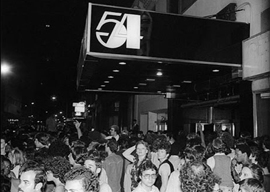
April 29, 2017

Twenty-five years ago this week, Los Angeles was burning because of Rodney King’s beating by the fuzz and I had my shoulder sliced open by a doctor in order to repair torn ligaments. My shoulder hurt more than Rodney’s ribs, because I saw him on TV get up and gesticulate freely after being whacked rather hard by four cops. I didn’t lift my arm for months. Lesson to be learned: Better to have four cops beat you than to run into an ice wall at a high speed while skiing with snow blindness.
Forty years ago this week, there was better news: Studio 54 opened its doors, changing the Big Bagel’s nighttime culture forever. Started by two friends of mine—they became friends after a rocky start—Studio was entered after a physical battle under the giant marquee with “deplorables” who lay siege all night against those of us who were signaled to enter upon arrival. The sidewalk was a scary zoo outside Studio, the non grata ones linking arms against those welcomed by the legendary Marc Benecke, and some even spitting at people like Warhol and his entourage as the club’s heavies escorted them in. I never had any problem with the BBQs—Brooklyn, Bronx, and Queens crowds—as I always dressed square and never expected the heaving humanity to open up à la Red Sea to welcome me. Lesson to be learned: Act like an old-fashioned gent, never like a haughty celebrity, and the crowd will neither spit on you nor try to keep you out.
Studio was redolent of secret chambers. There were nooks and crannies and places where people openly screwed and took drugs. What amazed me was the fact that it was always referred to as exclusive, but when at full capacity it held 2,000 persons, a fact that always led me to question its exclusivity. Which brings me to the point of my story.
What I miss most when in New York is not Studio, or Nell’s, or even El Morocco, but the small cabarets, back then known as saloons or dives, where jazz musicians and singers could take popular songs and deliver them to you as though they were confiding in your ear. They were dark and they were smoky and they were small, and the best of them, near Third Avenue and 55th Street, was called the Blue Angel. It opened its doors late, as Elmo’s and the Stork Club closed theirs, and its lavishly upholstered room was straight out of a Berlin whorehouse of the ’20s. Eartha Kitt and Johnny Mathis and Woody Allen got their start there, and the place was packed with celebrities who lived at night, people like Tallulah Bankhead and Marlene Dietrich and that awful Truman Capote. For some strange reason I used to be in the gossip columns back then, especially around 1956, due to the film stars I used to escort around. The maître d’ of the Angel treated me like a celebrity; that was a first and last, I might add.
Manhattan back then had more piano bars than immigrants, cocktail pianists in smoking jackets who played their hearts out over the noise of drunks in long seamless medleys. This was the best part of the day—evening, rather. You’d pick up your date after a hard day on the tennis court, head for a piano bar while her stomach was empty, get well oiled, and then on to a restaurant, followed by El Morocco. Then, while holding on to each other for balance, head for the Blue Angel until dawn. Then on to even better things due to youthful horniness. It might sound like a dull life, but I wouldn’t trade it for a Nobel Prize in Literature.